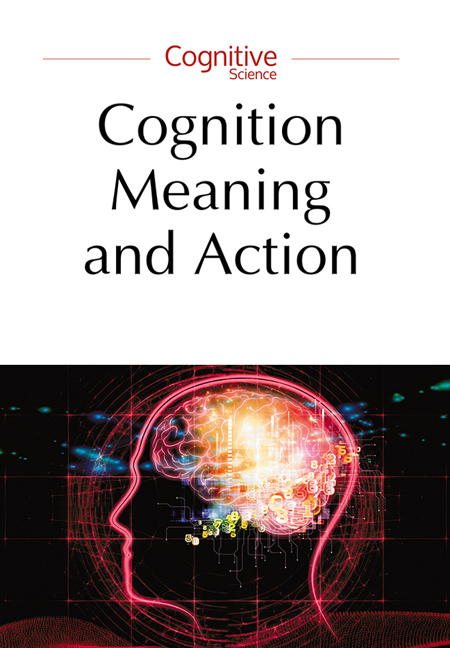Book contents
- Frontmatter
- Contents
- The crossroads of cognitive science
- Cognitive science: From computers to ant hills as models of human thought
- Two procedures expanding a linguistic competence
- Neurobiological basis for emergence of notions
- Similarity as distance: Three models for scientific conceptual knowledge
- The Approximate Numbers System and the treatment of vagueness in conceptual spaces
- Communication, cognition, and technology
- To tell and to show: The interplay of language and visualizations in communication
- Semiotics, signaling games and meaning
- Out of the box thinking
- The everyday of decision-making
- Short- and long-term social interactions from the game theoretical perspective: A cognitive approach
- Notes about Authors
Short- and long-term social interactions from the game theoretical perspective: A cognitive approach
Published online by Cambridge University Press: 10 January 2018
- Frontmatter
- Contents
- The crossroads of cognitive science
- Cognitive science: From computers to ant hills as models of human thought
- Two procedures expanding a linguistic competence
- Neurobiological basis for emergence of notions
- Similarity as distance: Three models for scientific conceptual knowledge
- The Approximate Numbers System and the treatment of vagueness in conceptual spaces
- Communication, cognition, and technology
- To tell and to show: The interplay of language and visualizations in communication
- Semiotics, signaling games and meaning
- Out of the box thinking
- The everyday of decision-making
- Short- and long-term social interactions from the game theoretical perspective: A cognitive approach
- Notes about Authors
Summary
Introduction
Game theory is a growing field of analytical modelling of interactions between agents. It has found many applications in economics and business administration, as well as in social and cognitive sciences. Among various forms of one-off and multi-period games, the probably most popular one is known as a prisoner's dilemma. This paper analyses the social interactions from the perspective of the equilibria resulting from the prisoner's dilemma models with a short and indefinite time horizon.
A one-period interaction modelled in the prisoner's dilemma setting results in an equilibrium point where the agents are maximising their short-term profit and thus, interacting, they reach a suboptimal point of overall welfare. However, in a model with an indefinite time framework, it is likely to reach an equilibrium which is consistent with the cooperative behaviour over a longer period of time. In result, an optimal point from the perspective of welfare is reached. In the following analysis, we relate these model results to social interactions and discuss their possible applications in cognitive science.
The paper is related to the literature on game theory and its applications in social interactions. Research in game theory dates back to the nineteenth century, when, among others, the theories of strategic interaction in oligopolies have been developed (see, e.g. Bertrand, 1883, or Varian, 2006 for an overview). In the first half of the 20th century, Neumann and Morgenstern (1944) applied game theory to the economic interactions among agents who maximise their utility (see also Neumann, 1928 or Copeland, 1945 for the review of Neumann, Morgenstern, 1944). Following this, the field grew intensively, with the range of underlying concepts developed and extensive applications to many areas of economic research (see, e.g. Shapiro, 1989; Kreps, 1990 and Selten, 1999). In particular, in 1994 John C. Harsanyi, John F. Nash Jr. and Reinhard Selten received the Nobel Prize in Economic Sciences “for their pioneering analysis of equilibria in the theory of non-cooperative games”. Following this work, game theoretical results have been validated from the behavioural perspective, as well as by experiments (see, e.g. Smith, 1992 or Crawford, 1997),2 while the framework to analyse conflict and cooperation of economic agents has been developed further.
- Type
- Chapter
- Information
- Cognition, Meaning and ActionLodz-Lund Studies in Cognitive Science, pp. 181 - 192Publisher: Jagiellonian University PressPrint publication year: 2015



